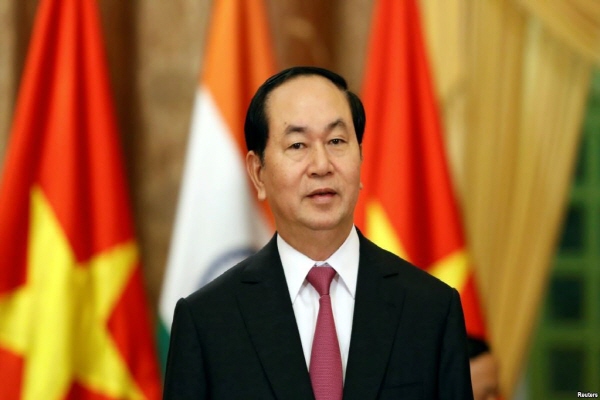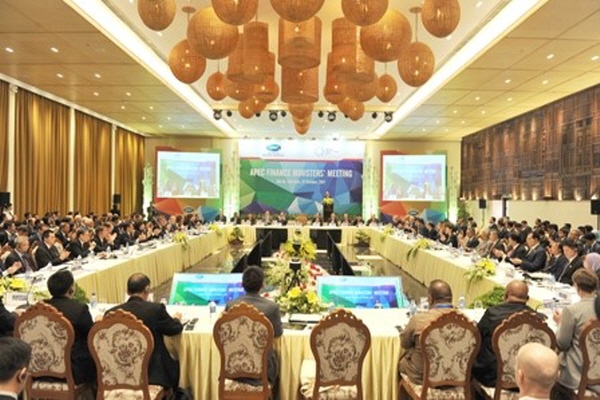Message by President Tran Dai Quang of Viet Nam
The following article was provided to The Korea Post media by the Embassy of Viet Nam in Seoul for publication.—Ed.
Hosting APEC 2017 is a top priority in Viet Nam’s foreign policy agenda, as it aspires to make greater contribution to an ever-thriving Asia-Pacific region. After more than 30 years of reform and extensive regional and international integration, Viet Nam today is a highly open and dynamic economy, projected to become one of the ten fastest growing economies in the world.
All preparations are being made to ensure that 2017 is another successful year for APEC. Viet Nam is ready to welcome all member economies to participate in APEC 2017 activities, held throughout Viet Nam, as well as in other member economies.

APEC is at a crucial juncture. A rapidly changing world and a transforming Asia-Pacific are presenting us with unprecedented opportunities and challenges. The Fourth Industrial Revolution, the 2030 Agenda for Sustainable Development and the Paris Agreement on Climate Change have laid important foundations for sustainable, inclusive and equitable global development. Yet, the confluence of prolonged economic stagnation, new waves of protectionism, terrorism, regional conflicts and climate change, amongst others, ever more complex and interrelated non-traditional security challenges are exerting far-reaching impacts on each and every economy, business and individual across the world.
More than ever, APEC must continue to uphold its leading and pioneering role in creating new drivers to build the Asia-Pacific into a region of peace, stability and dynamic, sustainable and inclusive development. Viet Nam therefore proposes “Creating New Dynamism, Fostering a Shared Future” as the overarching theme for APEC 2017.
Accordingly, APEC 2017 deliberations shall seek to create new dynamism in order to:
- Accelerate the accomplishment of the Bogor Goals on trade and investment liberalization by 2020 according to its roadmap;
- Deepen regional integration through efforts to revitalize economic, trade and investment ties; promote connectivity in all the three domains – infrastructure, institution and people; promote global value chains connectivity; enhance sub-regional and remote area connectivity; promote sustainable tourism, and expand cultural, youth and student exchanges;
- Further sustainable, inclusive and equitable growth; accelerate structural reforms; raise productivity and develop high-quality human resources. It is essential to better tap into the opportunities offered by the digital revolution.
- Improve the competitiveness and innovation of enterprises, especially micro, small and medium enterprises (MSMEs) in the digital economy and the internet; unleash the great potentials of public-private partnerships and businesses, especially women-led enterprises and young entrepreneurs.
- Increase the resilience and inclusiveness of APEC economies, particularly in promoting education, employment, healthcare, gender equality, sustainable rural and agricultural development to adapt to climate change, and ensuring food, energy and resources security, especially water resources.

The 21st century is expected to be the century of the Asia-Pacific, home to the world’s most dynamic economies. Throughout its 27 years of existence, APEC has proven to be responsive and effective mechanism, making important contributions to regional prosperity. It is now incumbent upon APEC to reaffirm its role as an incubator of ideas and a driver for regional growth and connectivity.
It is therefore crucial that APEC member economies continue to discuss the post-2020 vision and direction for APEC, working together towards an “Asia-Pacific partnership for sustainable and inclusive development for the 21st century.”
Theme of meeting: Creating new dynamism, fostering a shared future
Creating “new dynamism” for economic growth and integration has become an urgent demand for the Asia-Pacific amid sluggish recovery of regional and global trade and economic growth in the aftermath of the global financial crisis. Boosting trade and investment, and promoting economic integration, structural reforms and SMEs innovation are critical factors that enable APEC economies to better harness all opportunities from the fourth industrial revolution and the third wave of globalization. The theme also accentuates the common and long-term goal of APEC to build a peaceful, stable, integrated and prosperous community in the Asia-Pacific.
Priorities: To highlight the theme of APEC 2017 and ensure continuity to the priorities of APEC Peru 2016, Viet Nam has selected four priorities:
1. Promoting Sustainable, Innovative and Inclusive Growth: Sustainable, innovative and inclusive growth has been one of APEC’s top priorities in the context of global economic uncertainties and rising inequalities. Emphasis is placed on the dimensions of sustainability and inclusiveness of growth in order to help realize the APEC Strategy for Strengthening Quality Growth for the period until 2020 and the United Nations’ Sustainable Development Goals. In addition, structural reform and innovation are crucial in creating new dynamism for growth through improving labor productivity, enhancing human resource development and ensuring effective resource allocation. This pattern of growth places people and businesses at its center.`
2. Deepening Regional Economic Integration:
Deepening regional economic integration and improving connectivity in recent years have been high on APEC agenda to meet economies’ increased demands for greater economic linkages and development. This year, APEC will continue to accelerate the realization of the Bogor Goals of free and open trade and investment by 2020 with a new sense of urgency as well as enhance the three dimensions of connectivity, physical, institutional and human to human. Renewed efforts will be needed for APEC to endure as the driver of deeper regional economic integration.
3. Strengthening MSMEs’ Competitiveness and Innovation in the Digital Age:
Micro, Small and Medium Enterprises (MSMEs) are key drivers of growth and employment for APEC economies. It is their growth and greater inclusion in global value chains that will translate into the dynamic development of the economy. The arrival of the digital age, with all its opportunities and challenges, has made it all the more important to strengthen MSMEs’ “competitiveness and innovation”. This priority for APEC 2017 will help maintain the important momentum to advance APEC's work with regard to MSMEs.
4. Enhancing Food Security and Sustainable Agriculture in Response to Climate Change:
Food security has always assumed major importance in APEC cooperation as the Asia-Pacific region provides 55% of global agricultural produce. Food security is also listed as the second goal of the United Nations’ 2030 Agenda for Sustainable Development. In recent years, APEC has increased its focus on addressing the negative impact that climate change has had on efforts to improve food security and achieve sustainable agriculture. Linking food security with “sustainable agriculture in response to climate change” is aimed at helping APEC respond more effectively to the ever-intensifying impacts of climate change in the region.

